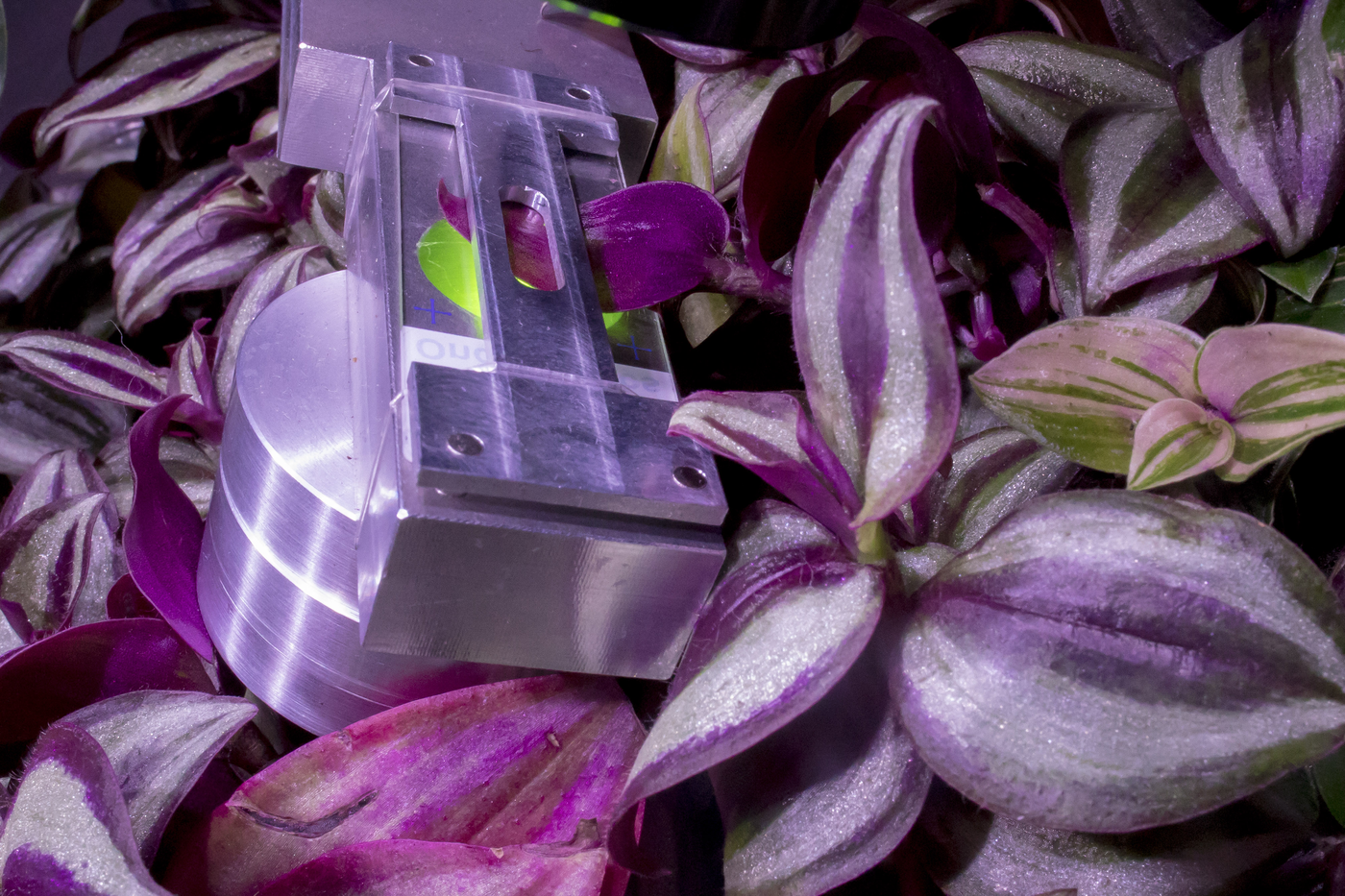The Poetry of Plants
Slovenian bio-artist Špela Petrič creates human-plant hybrids, lip-reads leaf pores, and gives sex advice to flowers.

© Miha Fras
Lara Ritter: For the video Reading Lips you filmed leaf pores opening and closing, resembling mouths that are speaking. You hired a lip reader to translate the messages, which consist of syllables like “Bit Pre I Ne Gan.” It’s a wonderfully poetic and funny piece. How did it come about?
Špela Petrič: The idea came to me as I was studying leaf pores, called stomata, as part of a research project. I was absolutely fascinated by how much they reminded me of mouths trying to communicate something. This phenomenon of recognizing what we suppose to be faces, familiar beings, or objects in things and patterns is a cognitive error called pareidolia. I deliberately play with that in the video, with the aim of showing that we are constantly trying to understand nature from a human perspective. Another thing that makes the piece exciting, of course, is the thought that one day it might actually be possible to communicate with plants.
Are there already ways to communicate with plants?
We communicate with plants all the time, we’re just not aware of it. For example, when we pee in the grass. It receives information about us through our urine. When we eat plants, we take their messenger molecules into our bodies. With the piece Phytoteratology, which is part of my series Confronting Vegetal Otherness, I wanted to visualize this blurring of the boundaries between plants and humans. To do this, I grew plant embryos in an artificial womb and supported their development with sex hormones that I had extracted from my urine. This resulted in unique body morphologies, strange hybrids of human and plant. I was moved by the vegetal monsters that this incredibly intense work gave rise to.
Tell us about your other work with plants.
As part of the piece Plant Sex Consultancy, I collaborated with other scientists to build medical devices that help plants improve their reproductive strategies. We made these devices to look like sex toys as a tongue-in-cheek challenge to the perception of plants as insensate beings. I also once did a performance called Skotopoiesis, for which I spent twenty hours standing in front of an illuminated area planted with cress, casting my shadow on it. The cress, which you usually only see on top of a sandwich, suddenly became the center of attention. When I finally moved, my silhouette was left on the cress—it had recorded the traces of my presence.
What do plants mean to you? They play a big role in your artistic work.
I find that plants present an interesting challenge and offer new perspectives. They’ve become something like my teachers. For a long time they didn’t interest me—even during my biology studies I was ignorant of them. The phenomenon that we tend to overlook plants even has a name, it’s called “plant blindness.” At some point, I began to wonder why plants get so little attention, even though they are the basis of all life on Earth and almost always part of our environment. To find an answer, I started a series of artistic experiments that radically changed my relationship with plants. I began to establish an intimate relationship with them and the strangeness that surrounds them.
Why are we humans blind to plants?
We pay attention to things that move at a human pace and resemble us. In Western culture, there is a tradition of ordering living organisms hierarchically, and plants were always positioned in a subordinate role. In the face of ecological crisis, that historical legacy has proved to be fateful. We have a dysfunctional relationship with the flora and fauna, when in fact plants would be wonderful allies in the fight for a better future.
So you think it isn’t ethical to eat plants?
No, we humans need to consume other organisms. We can’t survive without members of other species dying. You can only live as a vegetarian or vegan if you exclude certain organisms, such as plants, from your ethical considerations. There are alternative points of view that consider being part of the food chain as a natural process of life.
How might plants help us save humanity?
We should start paying attention to plants without always expecting something in return, be it a fresh salad or a beautiful green home. Their gratitude alone is worth giving them time. They are slow, they are quiet, they are persistent. Connecting with them gives you joy and makes you stronger.
Thank you for the interview!